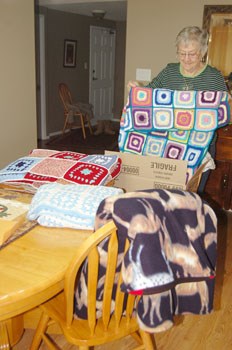According to American cultural anthropologist, Margaret Mead, one should never underestimate the power of a small group of people committed to changing the world.
The world is a much warmer, if not a brighter, place for many of Canada's homeless, thanks to an organization known as Blankets for Canada. This group of volunteers makes and distributes blankets to Canadians living in shelters, including families, youth, women and victims of floods and fires. For people who have recently lost their home, having a blanket that they can call their own can make all the difference in the world.
Weyburn's chapter of Blankets for Canada, which is run by retired health care worker Donna Loos, always welcomes donations of yarn and fabric, as well as assistance with covering costs for shipping to the various worthwhile destinations, such as the YWCA in Regina or Ronald McDonald House in Saskatoon.
Founded in 1998 in Lethbridge, Blankets for Canada is a charitable organization that has recorded more than 20,000 volunteer hours each month just from those who are knitting, crocheting and sewing blankets together all across Canada.
Blankets has no paid employees, so all the good work is done on a strictly volunteer basis. Even those who don't knit or sew can contribute, whether it be through donations of yarn or space in a mall or church, or through transportation of completed blankets to receiving agencies.
Blankets is non-denominational, not political and in fact receives no government funding. In the spirit of being their brother's keeper, volunteers have knitted, by hand and by machine, crocheted and quilted blankets to help warm their fellow Canadians.
Donna Loos had officially started the Weyburn chapter of Blankets for Canada by the time she retired in 2001. She has a network of knitters and quilters, as well as people who like to donate their leftover yarn and fabric, including fleece. Afghan blankets are often multi-coloured for this reason. In fact, the first rule of Blankets for Canada is that they don't make mistakes, they make originals.
"Sometimes they have a batten, sometimes they have flannelette sheet inside, depending on what we find," said Loos.
Loos spends several hundreds of dollars per year, out of her own fixed income, just to ensure the blankets are being made and distributed to the destined organizations. Even though the expenses are tax deductible, donations are always needed for materials and shipping costs.
Loos, however, perseveres.
"It breaks my heart to say, 'I don't have any wool', so I just go out and buy it," said Loos.
One way Loos has been saving on shipping costs has been through having people transport the boxes of blankets that would be travelling to Regina or Saskatoon anyway.
Loos needs to ship boxes of blankets about every two months.
"At Christmas time when I went to Saskatoon, my big suitcase was filled with stuff for Ronald McDonald House," said Loos. "But I didn't have to pay freight."
Loos has a few ladies in her volunteer network who like to make baby blankets, for which the Ronald McDonald House is an ideal recipient since they send a quilt home with each child who stays with them.
Recently a lady in Yorkton had offered to donate a large quantity of material but Loos's challenge was how to get the material without having to pay for shipping. It turned out that the woman's granddaughter works in Weyburn and she was able to pick it up for free.
Loos said that she has fourteen ladies in Esterhazy who make squares. The Esterhazy knitters then send them with a woman who comes to see her grandchildren in Weyburn. Loos spoke with the devoted group of women in Esterhazy on the phone recently, but she has never met them in person. Whenever she suggests they start a chapter of their own, they insist that they are happy just making the blankets for the Weyburn chapter because it is benefitting so many worthy causes in Saskatchewan.
For example, three full boxes recently went to Habitat for Humanity in Regina. Loos was happy to hear that the families going into the next two houses both have four kids, so the blankets will indeed be put to good use.
Loos once had a lady knitting for her, who was in a nursing home and she would not use just one roll of wool, she had to use two. The blankets were so thick that Loos gave them to members of the emergency services, for those who need to be covered on the highway or in other emergency situations.
When one considers the dynamic range of ways to contribute to Blankets, it makes sense that each person use his or her own unique skill set to do those things others may not find so easy. To piece together the large quantity of knitted and crocheted squares Loos receives from her group in Esterhazy, she relies on one kind lady's special skills.
"It's Norma Kapusianyk who puts the squares together and she does such a nice job," said Loos. There have been quite a few reliable volunteers over the years, but according to Loos, Mary Hubick is another lady who has been committed to the cause since the beginning.
The community of Weyburn should be proud to have such devoted artisans who care enough to donate their time and energy to showing kindness where it is much needed.
The gift of a blanket, especially for those who have had to seek refuge at a shelter or other temporary lodging, is a symbol of being loved and cared for. Blankets for Canada has made a way to send a nurturing embrace to someone who really needs it.




